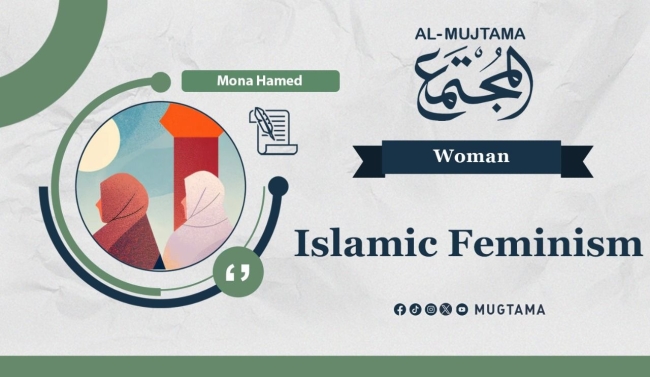Islamic feminism emerged as an intellectual movement in the late 20th century, aiming to reinterpret religious texts from a feminist perspective that supports women's rights. Its debates persist till this day, sparking numerous discussions in Islamic and academic circles about the compatibility of its ideas with the original Quranic teachings and whether these teachings need reinterpretation or simply more effective implementation.
The debate continues between those advocating for reinterpretation and those opposing what they see as ideological dilution and distortion disguised by modernization, especially regarding the principles and teachings of Islam as outlined in the Quran. These teachings do not recognize the relationship between men and women as one of identical equality but rather complementary equality.
However, the Islamic feminist movement promotes the possibility of achieving gender equality within an Islamic framework by reinterpreting religious texts. This view is expressed by Moroccan scholar Fatima Mernissi in her book “The Political Harem,” where she calls for liberating women from the male-dominated interpretations of Islam that have prevailed in Islamic thought for centuries, as she puts it.
Islamic feminism has evolved through various historical stages, as detailed by researcher Margot Badran in her study “What is Islamic Feminism?” She notes that the roots of this movement trace back to early thinkers like Aisha Taymur in Egypt, although its true development began in the 1980s and 1990s.
One of the central ideas of Islamic feminism is the reinterpretation of the concept of “qawama” (guardianship) in the Quran, arguing that it does not imply male authority but rather shared responsibility between spouses. This interpretation differs from the traditional view that sees male authority over women within the framework of guardianship.
Professor of Philosophy at Al-Azhar University, Dr. Amina Naseer, in her book “Women's Issues Between Tradition and Modernity,” argues that some extreme Islamic views have contributed to the spread of radical feminism. She states that cultural practices mistakenly attributed to Islam have marginalized women's roles in some Islamic societies. Naseer calls for a rereading of religious texts free from traditional male-dominated interpretations, asserting that true Islam inherently possesses the elements necessary for women's liberation and empowerment.
Agreement or Disagreement?
In this context, researcher Omaima Abu-Bakr, in her book “Women and Gender: Eliminating Cultural and Social Discrimination Between the Sexes,” asserts that there is a feminist movement striving for justice for women from within the religious framework. She believes that if religion is properly understood, it can be a source of liberation rather than oppression.
However, such a view has been refuted by numerous Islamic scholars and thinkers, notably Dr. Sami Amiri, Professor of Comparative Religions, who critiques this perspective in his book “Islamic Feminism: Between Alienation and Fabrication.”
Amiri contends that the Islamic feminist movement represents a deviation from the core principles of Islam, expressing a gender bias and using Islam merely as a marketing label. He sees it as a byproduct of attempts to hijack Islam by foreign schools of thought opposed to its definitive teachings.
Similarly, the late scholar Dr. Yusuf Al-Qaradawi, in his book “The Role of Women in Islamic Life,” asserts that the Quran acknowledges the natural differences between men and women. These differences do not imply discrimination but rather complementarity, indicating that the concept of identical equality between men and women cannot be placed within a proper Islamic context.
Conversely, Amina Wadud, in her book “Quran and Woman,” argues that a woman's testimony should be equal to a man's in all cases, despite the scholarly consensus that the Quran specifies certain situations where a woman's testimony is half that of a man's.
Evaluating the compatibility of Islamic feminism with Quranic teachings reveals numerous challenges. While this feminist movement seeks to achieve absolute gender equality under the claim that it aligns with Islam, the Quran emphasizes the principle of complementarity and balance rather than identical equality.
This is explicitly stated by the late scholar Sheikh Muhammad Al-Ghazali in his book “Women's Issues Between Stagnant Traditions and Modern Influences,” emphasizing that Islam respects the natural differences between the sexes without violating the rights of either.
Amidst the intense debate sparked by feminists with an Islamic background, there is a division regarding the impact of their movement and its culture on the broader Islamic context. This is highlighted in a study by researcher Zainab Ali Al-Bahrani, published in the “Journal of Women's Studies.”
Al-Bahrani reports that, in her study of women in the Middle East, 65% of Muslim women believe that what is termed “Islamic feminism” has improved women's conditions, while 35% think it has distorted the image of Islam.
The biggest challenge facing women's issues in our contemporary world is finding a balance between advocating for women's rights and adhering to Islamic principles, a balance that is often undermined by both traditionalist views and feminist perspectives.
While feminism offers new interpretations of religious texts that frequently extend beyond the linguistic meanings of the texts, traditionalist perspectives often conflate what is definitively stated in the Quran with inherited traditions influenced by jurisprudential schools, lacking a solid Quranic foundation.
Islamic feminism is a complex phenomenon that requires careful and in-depth study. It expresses a genuine need to reassess traditional understandings of women's issues in Islam but also raises fundamental questions about the limits and regulations of interpreting religious texts. The ideal approach, in our view, lies in benefiting from Islamic feminist perspectives that align with the authentic Quranic view while being cautious of extreme interpretations that may depart from the true spirit and essence of Islam.
-------------------------------------------------------------


